Text
Help Kids with Developmental Language Disorder

Children with Developmental Language Disorder (DLD) face significant challenges in understanding and using language, both spoken and written. The disorder is typically diagnosed by age 5 after assessing the child’s expressive and receptive language skills. Signs of DLD can include delays in speaking, difficulty following directions, difficulty finding words or connecting them together to form sentences, inability to use correct grammar or remember new words for conversation.
Parents whose children have been diagnosed with DLD may be faced with a difficult road ahead as they strive to provide their child with the best possible education and support. Depending on the severity of the disorder, appropriate intervention strategies can range from speech therapy to special school programs that may help your child succeed academically and socially.
It is important to stay informed about your child’s condition and to have realistic expectations for their progress. Working together with your child’s healthcare provider, teachers, and other professionals can help ensure that you are providing the best possible care and support.
If you suspect that your child may be experiencing challenges related to language development, it is essential to seek an evaluation from a trained professional as soon as possible. Early intervention is key in helping children with DLD succeed in all areas of life. With the right resources and support system in place, it is possible for children with DLD to make meaningful progress towards achieving their goals.
Parents, educators, speech-language pathologists and other professionals who work with kids with developmental language disorder can all play key roles in providing a supportive environment to help these children develop their communication skills. It’s essential for families to understand that helping kids with DLD is a team effort—collaboration between parents, teachers, SLPs, and other professionals is essential to provide the best possible outcome for these children.
One of the most important things that parents, teachers, and other caregivers can do is to create an environment which promotes language learning. This means finding ways to make communication fun, engaging and meaningful—using strategies like visual supports, interactive activities, and using visuals or gestures when talking with a child. And it’s also important to remember that every child is different—so be sure to tailor any strategies you use to each individual’s needs and preferences.
It is also important to remember that while a diagnosis of DLD can cause feelings of fear and uncertainty, it is important to stay positive and remember that children with DLD are capable of leading happy and successful lives. With the right resources and encouragement, your child can overcome many of the difficulties associated with this disorder and lead an enriched life.
The good news is that early intervention can make all the difference for a child with DLD. Speech-language pathologists (SLPs) specialize in helping kids with this disorder learn to use language efficiently. Through therapy, learning activities and other interventions, SLPs can help kids with DLD acquire the skills they need to succeed in school and life. With support from parents, teachers and other professionals, children with DLD can learn to communicate effectively and reach their full potential.
More than ever, there are a variety of resources available for helping kids with DLD—from online learning tools to parent support groups. So if your child is struggling with language learning difficulties, don’t wait any longer—seek out the help they need today! With the right intervention and supports in place, your child can develop the communication skills necessary for success.
No matter what challenges your child may face in their journey towards development, it is important to always remain supportive, informed, and understanding. If you need more information or support about DLD, there are specialized websites as well as organizations dedicated to helping parents understand this disorder better. With knowledge comes strength- so never hesitate to reach out for help when needed!
0 notes
Text
Connection Between ADHD and Learning Difficulties

There is a strong connection between ADHD and learning difficulties. Children with it often have difficulty paying attention and staying on task, which can make learning new information difficult. In addition, children with it may also have trouble with executive function skills, such as planning and organization. These skills are important for success in school and in life.
Children with it are more likely to struggle in school than their peers without it. They may have lower grades and test scores, and be more likely to repeat a grade or drop out of school altogether. In addition, children with it are at increased risk for social problems, such as peer rejection and bullying.
While the exact cause of ADHD is unknown, it is thought to be due to a combination of genetic and environmental factors. There is no single “cure” for it, but there are effective treatments that can help children manage their symptoms and succeed in school and in life. If you think your child may have it, it is important to talk to your doctor or a mental health professional. With proper diagnosis and treatment, most children with it can lead successful, happy lives.
One study found that children with it were more than twice as likely to have academic problems, including failing grades and being held back a grade, than children without it. They were also more likely to have social difficulties; such as being teased or rejected by their peers.
Other research has shown that children with it are at an increased risk for dropout rates and lower educational attainment. In one study, it was found that nearly 60% of young adults with it had not completed high school, compared to only 20% of those without it.
Attention Deficit Hyperactivity Disorder (ADHD) is a mental disorder that can affect both children and adults. It is characterized by problems with focus, hyperactivity and impulsiveness. People with it often find it difficult to learn in traditional educational settings.
People with it need different types of support in order to learn effectively. Some may need extra time to complete assignments or tests, while others may require more structured learning environments. There are many strategies that can help people with it, such as breaking down tasks into smaller parts, using flashcards and working with a tutor.
There is a strong connection between adhd learning difficulties. Many children with it also have difficulty learning in school. In fact, studies have shown that up to 65 percent of children with it have some form of learning disability.
This can make it very difficult for children with it to succeed in school. They may have trouble paying attention in class, struggle to complete assignments, and receive lower grades than their classmates.
There are many different types of learning disabilities, and not all children with it will have the same ones. Some common learning disabilities associated with it include dyslexia (difficulty reading), dysgraphia (difficulty writing), and math disorders.
While the connection between it and learning difficulties can be challenging, it's important to remember that all children are unique and will learn in different ways. With the right support, children with ADHD can succeed in school and reach their full potential.
If you think your child may have it or a learning disability, talk to your doctor. They can help you understand your child's symptoms and create a plan to help them succeed.
0 notes
Text
How Dyslexia and Learning Difficulties Affects Children
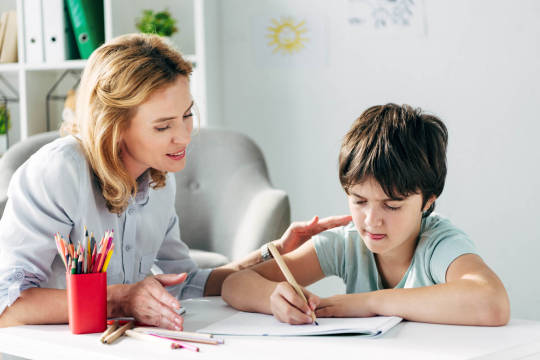
Dyslexia is a neurological disorder that affects reading skills. It is characterized by difficulty with accurate and/or fluent word recognition, poor decoding abilities, and difficulty with spelling. Dyslexia can also impact on a person's ability to read quickly, accurately and with comprehension.
While dyslexia occur in individuals who have normal intelligence and normal vision, it is not simply a problem with reversing letters or transposing words. It is a language-based learning disability that includes difficulties with phonemic awareness, phonology, verbal memory, vocabulary, and morphology.
Dyslexia occurs in individuals of all backgrounds and abilities. It is estimated to affect between 5-17% of the population.
Dyslexia can impact on all areas of learning, but is most often evident in reading and spelling. The good news is that with proper diagnosis and intervention, individuals with dyslexia can learn to read and spell at age-appropriate levels.
If you suspect that your child may have dyslexia, the first step is to consult with your child's school or a qualified educational psychologist. A comprehensive assessment will help to identify the nature and severity of the problem, and will guide decisions about appropriate interventions.
There are a number of effective interventions for dyslexia, including specialized teaching methods, assistive technologies, and accommodations in the classroom. With proper support, children with dyslexia can succeed in school and go on to lead successful lives.
If you are an adult with dyslexia, there are also a number of resources available to help you manage the condition. These include self-help books, websites, and support groups. Many adults with dyslexia find that they are able to lead successful lives despite their reading difficulties.
There is no single cause of dyslexia or learning difficulties. However, there are certain risk factors that may make a person more likely to develop these conditions.
Some of the most common risk factors for dyslexia and learning difficulties include:
- Having a family history of dyslexia or other learning difficulties
- Being born prematurely or with a low birth weight
- Having health problems during pregnancy or at birth that affected brain development
- Having hearing or vision problems
- Experiencing emotional or behavioural difficulties in early childhood
If you have any of these risk factors, it does not necessarily mean that you will develop dyslexia or learning difficulties. However, it is important to be aware of the risks so that you can get the help and support you need if you do experience these conditions.
If you think you or your child may be dyslexic, it is important to see a health professional for a diagnosis. A diagnosis of dyslexia or learning difficulties can help identify the best course of treatment and support. There is no single ‘cure’ for dyslexia or learning difficulties, but with the right help, most people with these conditions can lead fulfilling and successful lives.
Dyslexia and other learning difficulties can have a significant impact on children's ability to learn. They can affect their reading, writing, and comprehension skills. Additionally, they may also have difficulty with organization and time management. These difficulties can make it difficult for children to keep up with their peers in school.
There are a variety of ways that dyslexia and other learning difficulties can affect children. For example, they may have trouble pronouncing words correctly. They may also have difficulty with reading comprehension and be unable to read at the same pace as their peers. Additionally, they may struggle with writing tasks such as essays or reports.
These difficulties can lead to frustration and anxiety for children. They may feel like they are not as smart as their classmates or that they are not doing well in school. Additionally, they may become withdrawn and isolate themselves from others.
There are a number of ways to help children who are struggling with dyslexia and other learning difficulties. For example, parents can work with their child's teachers to create a specialized education plan. Additionally, there are tutoring and intervention programs available to help children improve their reading, writing, and comprehension skills. With the right support, children with dyslexia and other learning difficulties can succeed in school and in life.
0 notes
Text
What are the Effective Reading Instructions for Kids?

There are a few key things that you can do to make sure your reading instruction is effective for kids. Keep it simple. Start with the basics and gradually add more difficult concepts as your child's ability improves. Be consistent. Make sure you're using the same methods and materials each time you work with your child so he or she can build on what was learned before. Be patient. Learning to read takes time and practice, so don't get discouraged if your child isn't progressing as quickly as you'd like. With a little patience and persistence, your child will be reading in no time!
If you're looking for more tips on how to effectively teach reading to kids, be sure to check out our other articles on the subject. We cover everything from finding the right books to helping kids sound out words. With our help, your child will be reading like a pro in no time!
There are a variety of effective reading instructions for kids that can help them improve their reading skills. Some of these techniques include:
1. Encourage your child to read aloud as often as possible. This will help them to develop confidence in their reading ability and also identify any areas that need improvement.
2. Help your child to break down words into smaller chunks. This will make it easier for them to sound out the word and ultimately understand its meaning.
3. Encourage your child to use context clues when reading. This means looking at the surrounding text or pictures to help determine the meaning of unknown words.
4. Help your child to practice their fluency by having them read aloud regularly. This will help them to read with fewer mistakes and at a faster pace.
5. Encourage your child to ask questions when they are reading. This will help them to engage with the text and better understand what they are reading.
6. Help your child to identify key ideas and details when they are reading. This will allow them to better understand and remember what they have read.
7. Encourage your child to make connections while they are reading. This means relating the text to their own life experiences or other things that they have learned.
8. Help your child to summarize what they have read. This will ensure that they have understood the main points of the text and can recall key information later on.
9. Encourage your child to reflect on their reading. This means thinking about what they have read and how it has affected them.
10. Help your child to find resources to improve their understanding of the text. This could include looking up words in a dictionary or encyclopedia, or finding websites that provide more information on the topic.
11. Start by teaching them the basics of reading. This includes teaching them the alphabet, letter recognition, and phonics.
12. Once they know the basics of reading, you can start teaching them how to read instructions. Begin with simple instructions such as those found in books or on toys.
13. As they become more confident in their reading skills, you can give them more complex instructions to read. For example, you can give them recipes or game rules to read.
14.Help them practice their new skills by offering guidance and feedback. Encourage them to ask questions if they don't understand something.
15. Reward them for their efforts. This will motivate them to keep learning.
With these tips, you can help your kids learn how to read instructions and become more independent in their studies and in everyday life.
0 notes
Text
How to Handle Learning Difficulties in Children?
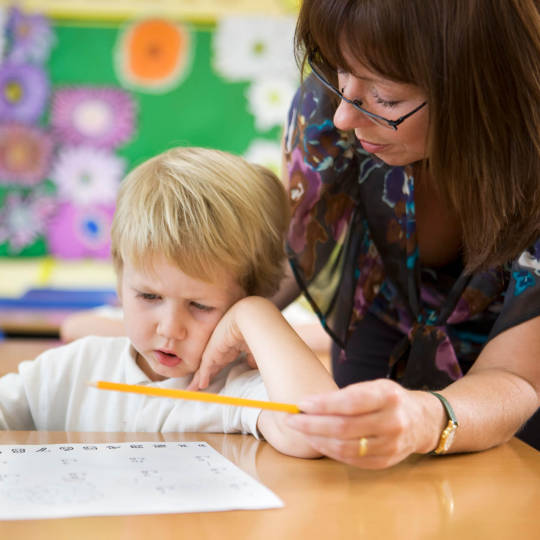
There are many different types of learning difficulties that can affect children. Some common ones include dyslexia, ADHD, and Asperger's Syndrome.
Dyslexia is a difficulty with reading. Children with dyslexia may have trouble with phonics, word recognition, and fluency. They may also have trouble with comprehension and recall.
ADHD is a condition that affects attention, impulsivity, and activity levels. Children with ADHD may have difficulty paying attention, staying on task, and controlling impulsive behaviours. They may also be overly active.
Asperger's Syndrome is a condition that affects social skills and communication. Children with Asperger's Syndrome may have difficulty understanding social cues, engaging in conversations, and making friends. They may also have repetitive behaviours or interests.
Learning difficulties in children can manifest in a variety of ways. Some common signs include difficulty with reading, writing, and/or math; problems with organization and paying attention; and issues with recall and memory.
It can be difficult to watch your child struggle with schoolwork, but there are ways you can help them overcome their learning difficulties. Talk to their teacher to find out what specific areas they are struggling with. Then, you can work on those areas at home with your child. There are also many different resources and programs available to help children with it. Make sure to encourage your child and praise their progress, no matter how small. With your support, your child can succeed in school despite their difficulties.
One of the most difficult challenges parents face is how to deal with learning difficulties in their children. While some kids seem to pick up new information and skills effortlessly, others may struggle for months or even years before they "get it."
If your child is having difficulty learning, it's important to get help early. The earlier you intervene, the better the chances are that your child will be able to catch up and eventually excel in school.
There are a number of ways you can help your child if he or she is having trouble learning. Make sure that you provide plenty of opportunities for your child to practice what he or she is supposed to be learning. If your child is struggling with reading, for example, read aloud to him or her every day and encourage him or her to read as much as possible.
In addition, consider seeking out a tutor or other type of outside help. A tutor can work with your child one-on-one, providing the individualized attention that he or she may need in order to succeed.
If you suspect that your child has a learning disability, it's important to get a professional evaluation as soon as possible. A learning disability is a neurological condition that affects the way the brain processes information. It's not something that your child will "outgrow" and it cannot be cured, but with proper diagnosis and treatment, most children with learning disabilities can learn successfully.
It can be difficult to watch your child struggle, but remember that you are not alone. There are many resources available to help you and your child cope with learning difficulties. With patience, love, and support, your child can overcome any obstacle.
0 notes
Text
Importance of Speech Therapy to Children
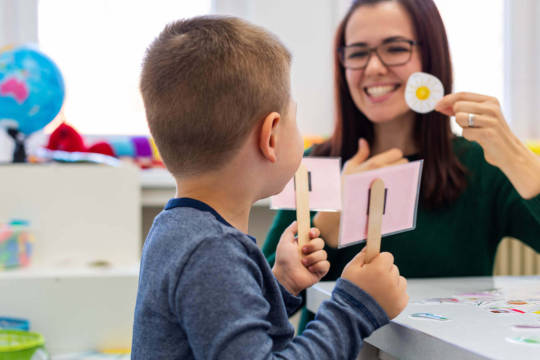
Speech therapy is important for individuals with communication disorders. Speech therapy can help these individuals improve their ability to communicate with others. The therapist can also help the individual to develop better speech and language skills. In addition, speech therapy can help the individual to cope with the effects of a communication disorder.
Speech therapy is an important part of treating communication disorders in children. It can help your child to improve their speech and language skills, as well as their social and emotional development.
Your child’s speech and language therapist will work with them to assess their needs and develop a treatment plan that is tailored to their individual abilities and goals. Treatment may include activities such as talking, listening, reading, and writing. The therapist may also use games, puppets, or other materials to help your child practice new skills.
Speech therapy can be beneficial for children of all ages. If you are concerned about your child’s speech or language development, talk to your doctor about referral to a speech therapist. Early intervention is key to maximizing the benefits of therapy.
Speech therapy is a type of therapy that helps children with language and communication disorders. Language disorders can make it hard for children to understand what other people say or to express themselves. Communication disorders make it hard for children to interact with others socially.
Speech therapists work with children to help them improve their language and communication skills. Speech therapy can help children:
- Improve their understanding of spoken language
- Increase their vocabulary
- Learn how to use correct grammar
- Improve their ability to express themselves clearly
- Make friends and interact more easily with others socially
Many speech therapists also work on helping children develop nonverbal communication skills, such as using facial expressions and gestures. Speech therapy can be beneficial for children with a variety of conditions, including:
- Autism spectrum disorder
- Cerebral palsy
- Down syndrome
- Hearing loss
- Intellectual disability
- Stroke
If your child has difficulty communicating, don't hesitate to talk to your child's doctor about the possibility of speech therapy. Speech therapy can make a world of difference in your child's life.
Speech and language therapy is important for people of all ages. It can help those who have difficulty communicating due to speech or language disorders, as well as those who have trouble understanding others.
The benefits of speech and language therapy can be seen in many different areas of life. For example, it can help improve communication between family members, friends, and co-workers. It can also help children do better in school by improving their ability to understand and express themselves. And it can even help people with Alzheimer's disease or other forms of dementia communicate more effectively.
If you or someone you know could benefit from speech and language therapy, don't hesitate to seek out a qualified therapist. With the right help, communication difficulties can be overcome and quality of life can be greatly improved.
0 notes
Text
How to Teach Kids with ADHD?

Most children with ADHD have difficulty sustaining attention, which can impact their ability to learn in the classroom. In addition, impulsivity and hyperactivity can make it difficult for children with ADHD to sit still or follow instructions. As a result, many children with ADHD struggle in school and may require special education services or accommodations.
There are a number of effective treatments for ADHD that can help children improve their focus, control their impulses, and succeed in school. Stimulant medications are often prescribed to treat ADHD and can be very effective in improving symptoms. However, medication is not the only treatment option for ADHD. Behavioral therapy, which teaches children strategies for managing their symptoms, can also be helpful.
If your child has been diagnosed with ADHD, it is important to work closely with their school to ensure that they are getting the support they need to succeed. Accommodations such as extra time for tests or shorter class assignments can make a big difference for children with ADHD. In addition, private tutoring or after-school programs can help children with ADHD catch up academically.
ADHD can be a challenge, but with the right support, children with ADHD can thrive.
There is no single answer to the question of strategies for teaching kids with adhd. However, there are some general principles that can be followed in order to help these children succeed in school and in life.
One of the most important things to remember is that every child is different. What works for one child may not work for another. It is important to tailor your approach to each individual child.
Another important thing to keep in mind is that children with ADHD often have difficulty paying attention. This means that you will need to find ways to hold their attention during class and while they are doing their homework. One way to do this is to use visual aids such as charts or graphs. Another way is to make sure that you keep your lessons interesting and interactive.
There are strategies that can be used when teaching kids with ADHD that can help them stay focused and engaged in the lesson. Some of these strategies include:
Breaking down tasks into smaller, more manageable steps.
Using visual aids to help keep kids on track.
Allowing for movement and activity during the lesson.
Encouraging participation through positive reinforcement.
Employing short, frequent breaks.
Providing opportunities for breaks. It’s important to allow kids with ADHD time to take breaks throughout the day in order to avoid burnout.
Allowing for flexibility. Kids with ADHD often thrive when they have some flexibility in their schedule and routine. This can help to avoid feelings of boredom or rigidity.
Utilizing positive reinforcement. Rewarding kids for good behavior can be a helpful way to encourage desired behaviors.
Creating a supportive environment. It’s important to create an understanding and supportive environment for kids with ADHD. This can help them to feel comfortable and safe while they learn.
With these strategies in place, children with ADHD can be successful learners in the classroom.
Lastly, it is important to be patient with children with ADHD. They may need more time to process information than other children. It is also important to give them frequent breaks so that they do not become overwhelmed.
0 notes
Text
Ways to Teach Kids with Learning Disabilities
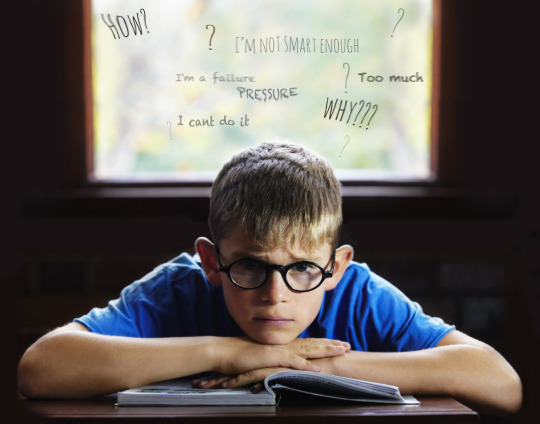
A learning disability is a neurological disorder that affects the way the brain processes information. People with learning disabilities have difficulty reading, writing, and doing math. They may also have problems with organization, time management, and following directions.
There are different types of learning disabilities. Some people have trouble with only one area, while others may have problems with several areas. The most common type of learning disability is dyslexia, which affects reading skills. Other types of learning disabilities include dyscalculia (difficulty with math), dysgraphia (difficulty with writing), and ADHD (attention deficit hyperactivity disorder).
Most people with learning disabilities are of average or above-average intelligence. However, their brains process information differently, which can make learning difficult.
Learning disabilities are not the result of laziness or a lack of intelligence. They cannot be cured, but with proper diagnosis and treatment, most people with learning disabilities can succeed in school and lead successful lives.
If you think your child may have a learning disability, talk to your doctor or a educational specialist. Early diagnosis and treatment are important. With the right help, children with learning disabilities can overcome their challenges and reach their full potential.
There's no one-size-fits-all solution when it comes to teaching kids with learning disabilities, but there are some general tips that can help. First, it's important to understand your child's specific learning disability and how it affects their ability to learn. Once you have a good understanding of the disability, you can begin to adapt your teaching methods accordingly.
It's also important to be patient and positive when working with a child with a learning disability. They may need extra time and support to master new concepts, so don't get discouraged if they don't seem to be progressing as quickly as other children. Just remember that every child learns at their own pace and eventually they will catch up.
If you follow these tips, you'll be well on your way to teaching kids with learning disabilities. Just remember to be patient, positive, and always involve the parents or caregivers. With a little bit of extra effort, you can make sure that every child has a chance to succeed.
Teaching kids with learning disabilities can be a challenge, but there are some things that you can do to make it easier. Here are some tips:
- Make sure that you understand the disability. Learning disabilities come in many different forms, so it is important to get as much information as possible about the specific disability. This will help you to choose the best teaching methods and materials.
- Be patient. Learning disabilities can make it difficult for children to learn at the same pace as their peers. It is important to be patient and give them the time they need to understand new concepts.
- Use different teaching methods. Some children with learning disabilities respond well to visual aids, while others may prefer hands-on activities. Experiment with different teaching methods to find what works best for the child.
- Be positive. It is important to encourage children with learning disabilities and praise them for their accomplishments. This will help them to build confidence and stay motivated.
Finally, make sure to involve the child's parents or caregivers in their education. They can provide valuable insight and support that will help the child succeed.
0 notes
Text
How to Assist Kids with Learning Difficulties?

One of the best ways to assist kids with learning difficulties is by using a multi-sensory approach. This means using a combination of different senses to help them learn. For example, you might use visual aids along with verbal instructions. Or, you could use music and movement to help them retain information. There are a variety of ways to incorporate a multi-sensory approach into your teaching. The important thing is to find what works best for your student and go from there. With a little trial and error, you should be able to find a method that helps your child succeed in school. If you're struggling with a learning difficulty, remember that you're not alone.
There is help available, and you can overcome your difficulties to lead a happy and successful life. There's nothing more frustrating than feeling like you're stuck in a rut, struggling to keep up with everyone else. If you have a learning difficulty, that feeling can be all too familiar. But it doesn't have to be this way. With the right support, you can help assisting students with learning difficulties and reach your full potential.
If you suspect you or your child might have a learning difficulty, the first step is to speak to your GP or school counsellor. They will be able to refer you for further assessment and support. There are many different types of learning difficulties, but some of the most common include dyslexia, dyscalculia and dyspraxia. Each affects people in different ways, but all can make everyday tasks like reading, writing and math’s more difficult.
If you suspect that your child has a learning disability, it's important to get them evaluated by a professional. Only a qualified specialist can diagnose a learning disability. Once your child has been diagnosed, you can work with their school to create an Individualized Education Program (IEP). This document will outline the accommodations and services that your child needs in order to succeed in school. If you need assistance creating an IEP or advocate for your child's rights, there are a number of organizations that can help. The most important thing is to never give up on your child. With the right support, they can overcome any obstacle. There are a number of things that you can do to help your child if they are having difficulty learning.
First, make sure that they are getting enough sleep and eating a nutritious diet. These things will help them to be more alert and able to focus.
Second, provide them with a quiet place to study where they will not be distracted. This may mean setting up a special study area in your home or taking them to the library to use a quiet room.
Third, give them plenty of time to practice what they are learning. If they are having difficulty with a particular concept, have them work on it for longer periods of time or break it down into smaller steps.
Finally, talk to their teacher about what you can do to help at home. The teacher may have some suggestions about how you can assist your child with their learning.
If you follow these tips, you will be helping your child to overcome their learning difficulties and become a successful student.
0 notes
Text
How Does Dyslexia Affect Learning?

Dyslexia is a learning disability that can make it difficult for children to read, write, and spell. Dyslexia occurs in children of all abilities and from all walks of life. Most children with dyslexia have difficulty with phonemic awareness, phonology, and word decoding skills. These difficulties can make it hard for children to learn to read and write.
There is no single cause of dyslexia. It is believed to be caused by a combination of genetic and environmental factors. Dyslexia is a lifelong condition. However, with early diagnosis and proper intervention, most children with dyslexia can learn to read and write at grade level.
If you suspect that your child may have dyslexia, please contact your child's school or doctor. Early diagnosis and treatment is essential for helping children with dyslexia succeed in school and in life. Dyslexia can impact every aspect of learning. It can make it difficult to read, write, spell words correctly, and understand what others are saying. It can also affect a person's ability to concentrate and remember information.
Dyslexia and learning does not only impact reading skills. It can also affect a person's ability to learn new information and to remember what they have learned. Dyslexia can make it hard to understand concepts that are taught in class, and it can also make it hard to complete assignments.
Fortunately, there are ways to help people with dyslexia to overcome these challenges. Specialized tutoring, accommodations, and assistive technology can all make a big difference in helping a person with dyslexia succeed in school and in life.
If you think you or someone you know might have dyslexia, it is important to talk to a doctor or other healthcare provider. There are many resources available to help people with dyslexia, and early diagnosis and intervention can make a big difference.
Most people with dyslexia have difficulty with some of the following:
- recognizing and naming letters
- being able to read quickly
- pronouncing words correctly
- being able to spell words correctly
- understanding what they read
- organizing information
People with dyslexia often have trouble with reading comprehension. They may lose their place while reading, or have difficulty understanding what they have read. This can make it hard to follow directions, do schoolwork, or read for pleasure.
Dyslexia can also impact writing. People with dyslexia may have trouble organizing their thoughts on paper, or struggle with spelling words correctly. This can make it difficult to write stories, essays, or even just take notes in class. Dyslexia can be frustrating and isolating, but there are ways to manage it. With the right support and accommodations, people with dyslexia can succeed in school and in life.
Dyslexia can impact a child's learning in a number of ways. For example, they may find it difficult to keep up with their classmates when following along with a lesson or when completing assignments. Additionally, they may struggle to remember information that they have learned due to the difficulty processing written language. This can make it challenging for them to do well on tests or exams.
There is no single cause of dyslexia, but it is believed to be caused by a combination of genetic and neurological factors. While there is no cure for dyslexia, early diagnosis and intervention can help children manage the condition and improve their reading and writing skills. With the right support, children with dyslexia can succeed in school and reach their full potential.
0 notes
Text
The Importance of Speech Therapy for Kids

Speech therapy is an important part of many children's lives. It can help them to overcome difficulties with language and communication and improve their overall quality of life.
For children with language disorders, this therapy can be vital in helping them to develop the skills they need to communicate effectively. Speech therapists work with children of all ages to help them improve their language and communication skills.
Children who have difficulty communicating can often feel isolated and alone. This therapy can help them to build self-confidence and feel more included in social situations.
Speech therapy can help kids with a wide range of communication disorders. These disorders can make it difficult for children to express themselves or understand what others are saying. By working with a therapist, kids can learn the skills they need to improve their communication abilities.
There are many different types of communication disorders that can benefit from therapy. Some of the most common include:
Autism Spectrum Disorder
Autism spectrum disorder (ASD) is a developmental disorder that affects social interaction, communication, and behavior. ASD can make it difficult for people to interact with others and to understand and use language. Speech therapy for kids can help people with ASD develop the communication skills they need to interact more effectively with others.
Cerebral Palsy
Cerebral palsy is a neurological disorder that affects movement and muscle coordination. People with cerebral palsy often have difficulty speaking clearly.
Down Syndrome
Down syndrome is a chromosomal disorder that causes developmental delays and physical abnormalities. People with it often have difficulty communicating and understanding language. Speech therapy can help people them develop the communication skills they need to interact more effectively with others.
Speech Sound Disorders
Speech sound disorders make it difficult for people to produce certain sounds correctly when they speak. This can make it hard for others to understand what they are saying.
If you are concerned that your child may have a communication disorder, it is important to talk to your child’s doctor. Your doctor can refer you to a speech therapist for an evaluation. The therapist will assess your child’s communication skills and determine whether therapy would be helpful.
Speech therapy usually involves working with a therapist on specific exercises and activities to improve communication skills. The therapy can be done in individual sessions or in group settings. It is important to find a therapist who is experienced in working with children and who uses evidence-based practices.
It can help kids with communication disorders develop the skills they need to interact more effectively with others. If you are concerned that your child may have a communication disorder, talk to your child’s doctor about referral for speech therapy.
If you think that your child could benefit from this type of therapy, it is important to speak to your doctor or pediatrician about the options available. They will be able to advise you on the best course of action for your child's individual needs.
0 notes
Text
Language and Learning | Speech and Language Therapist Training

Welcome to Language and Learning. Here you will find a wealth of information & speech and language training for teachers, school leaders & speech therapists working with students across K-12. These training courses and coaching opportunities are designed to equip you to support your staff and students to be the best they can be provided by someone who has navigated many of your challenges in school leadership roles. Kathryn can share her lessons learned to help you work smarter, not harder.
0 notes
Text
How Speech Therapy Benefit your Kid?
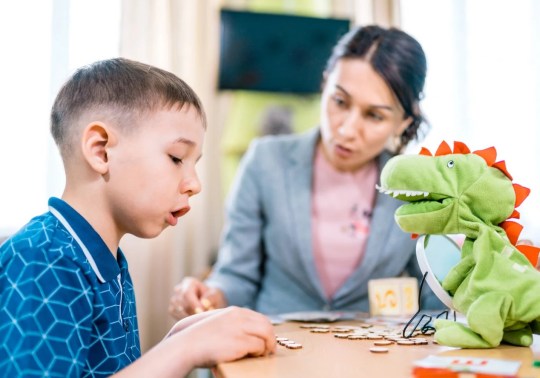
It is important for a kids with an absence of verbal interaction to be provided with continuous language support and treatment so they can communicate their standard needs and wants to others. A kids who is limited without a voice is extremely limited in the ability to choose, socially interact among peers and can in severe situations be shut off to the world entirely.
There are numerous forms of speech concerns such as stuttering, paying attention abilities and language skills. The main objective of speech therapy for kids is to enhance overall interaction. Take a look at a few of the ways it can benefit your kid.
Helps with Social Abilities
Establishing social abilities is extremely essential terms of connecting with others in the neighborhood and throughout life. When somebody has extremely minimal functional speech skills, frequently the procedure of creating these abilities are dramatically delayed. Social skills can be taught at fundamental degrees through apps, social stories and a lot more strategies and approaches.
Displaying manners and being considerate of the sensations of others are necessary components of good social skills. Like any skill, social skills can be learnt through recurring support from experts and situations that require verbal interaction such as in the class.
Improved Communication Skills
Having the ability to connect with your child is extremely vital. It is right here where they discover the essential abilities like social communication and the capacity to make choices. Speech pathologists provides speech and language therapist training and have come a long way in terms of developing successful tools and approaches.
An example is utilizing language to reveal a lot more intricate suggestions, motivating kids to make use of words like "and" to extend the sentence and construct confidence. Structure vocabulary gives the kid more words and expressions to use, vocab games is a tool used by pathologists to make them really feel a lot more comfy and confident with completion objective of giving them extra devices for communication.
Receptive Language
It is one thing to speak and to express language, but it's an additional to receive it. Children's ability to interpret and understand language is extremely important in the growth procedure. Recognizing exactly how to interact when obtaining cues will certainly motivate much better social abilities and the capacity to read circumstances comes to be significantly simpler.
Experts in the field can help educate your kid brand-new vocabulary on exactly how to use the knowledge and adhere to instructions, answer inquiries and taking part in conversations with peers.
Can Assist With Stuttering
Stuttering is a relatively common interaction disorder among kids influencing the speech fluency. It commonly starts in early childhood years and is diagnosed by breaks in speech with can substantially influence their interaction. There might likewise be second actions such as snagging activities in the limbs and tensions in the jaw and face muscular tissues.
Speech therapy for kids can reduce impacts on kids via techniques and devices such as trying to make the kids really feel as pleased as possible with enjoyable and exciting video games that urge speaking. Promoting grinning and laughing increases the fluency in speech and subconsciously shows the child that speaking is an enjoyable and pleasurable method to connect.
It is very essential for kids to receive support if there are troubles with their speech. Points like social communications become tough as they don't know exactly how to mingle effectively due to constraints such as stutters and receptive language issues.
0 notes
Text
How to Teach Kids with Learning Disability
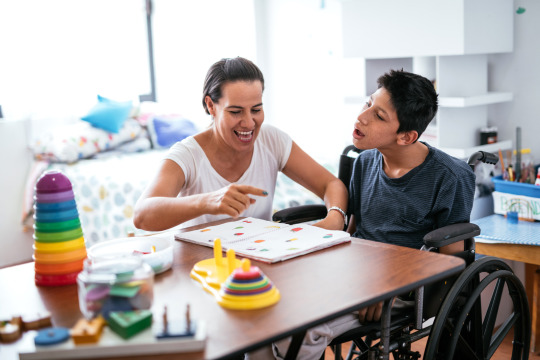
There is no one-size-fits-all answer to the question of how to teach kids with learning disability. However, there are some general principles that can help guide educators in developing instruction plans that are tailored to the needs of these students.
One of the most important things to keep in mind when teaching kids with learning disability is that they often benefit from a multisensory approach to learning. This means incorporating visual, auditory, and kinesthetic (movement-based) elements into lessons. For example, if you are teaching a lesson on fractions, you might use manipulative along with a number line to help kids visualize the concepts. You might use music or rhymes to help them remember key points.
Another important principle to keep in mind when teaching kids with learning disability is that they may need more time and practice than their peers to master a new skill. For this reason, it’s important to be patient and give students the support they need while they are learning. Some strategies you could use include breaking down complex tasks into smaller steps, providing additional guidance or instructions as needed, referring to nesa training courses and incorporating frequent repetition. In addition, make sure to provide plenty of positive reinforcement along the way!
A learning disability can affect an individual's ability to learn and process information in different ways. If your child has been diagnosed with a learning disability, it is important to understand the best way to teach them and help them succeed.
There are many different teaching methods that you can use when working with a child who has a learning disability. One of the most important things to do is to provide them with plenty of opportunities for hands-on learning and practice. This type of active learning will help your child build their skills and improve their understanding of new concepts.
You can try using visual aids such as flashcards, charts, or diagrams when teaching your child. These tools can be very useful in helping your child remember key concepts. Make sure to use clear and concise instructions when working with visual aids.
It is important to create a learning environment that is conducive to your child's success. This means creating an area that is free of distractions and where your child can focus on the task at hand. It can be helpful to provide your child with their own space to work in, such as a desk or table in their bedroom.
If you are having difficulty teaching your child due to their learning disability, there are a number of resources available to help you. There are many books and websites that offer tips and advice on how to effectively teach children with learning disabilities. You can contact your child's school for additional resources and support.
Teaching your child with a learning disability can be a challenge, but it is important to remember that every child is different. You will need to find the methods that work best for your child and their particular needs. With patience and perseverance, you can help your child overcome their learning disability and become successful in school and in life.
0 notes
Text
Different Cognitive Assessments and Their Uses
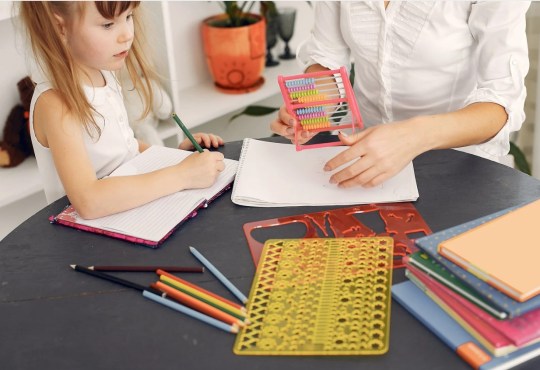
Cognitive abilities are the core abilities the brain utilizes to assume, check out, discover and bear in mind, factor and listen. All these functions work in harmony to help an individual take in the information and relocate to the expertise financial institution section of the brain for use in daily life at college, job and anywhere else.
When you have kids in the house, it can be difficult to decide whether you should send your kid to a baby room. To arrange with the prejudiced opinions on both sides, you need to look only at the realities and identify what is finest for their unique needs.
Cognitive abilities are necessary to perform any kind of task, be it standard or facility. Simply put, cognitive abilities aid in acquiring actual understanding. Cognitive abilities are controlled by neuronal network, which is considered to be the functional unit of human knowledge. The evaluation of cognitive skills is feasible with the use of a number of different sorts of cognitive test. These tests have numerous applications throughout different age and various domains.
Applications of Cognitive Analysis for Children
Cognitive evaluations are carried out to kids of numerous age groups to establish their cognitive stamina and weaknesses to make sure that instructors and moms and dads can help the kids enhance their efficiency. The kids are normally analyzed on their spoken comprehension, vocabulary, general understanding, capability to discuss various ideas, understanding of visual spatial, application of acquired knowledge and fluid thinking.
Cognitive capacity examinations evaluate the ability of the child to find out, keep and finish new details. These examination results can be found in actual useful in countries that have unique colleges and programs for talented children and kids with finding out problems. The talented ones are motivated to join unique programs to establish their unique abilities and abilities. On the other hand, children with discovering troubles are offered special care and support to help them do much better.
Experienced psycho therapists with nesa accredited courses advise that cognitive examinations ought to be provided together with typical psychometric devices for a much better and overall understanding of the kid’s capabilities.
The demand for cognitive skills is not limited to the childhood years. It is called for throughout the life. Cognitive ability tests are provided to prospects applying for task positions at various firms. They aid companies judge the capability of the candidates to obtain, retain and use information in a working environment.
In other words, cognitive examinations allow recruiters to measure the candidate's aptitude and ability to resolve issues, to make the best working with decision. A wise candidate with the right understanding, experience and aptitude is the ideal choice for any position at any type of organization and cognitive analyses assist employers recognize and select them appropriately.
The ideal fit for the work position ensures a win-win situation for the employee along with the organization in regards to efficiency, productivity and success.
Cognitive tests are additionally recommended medically for people in between the ages of 50 and 70, specifically for those who have a family history of Alzheimer's illness. They aid discover very early signs of cognitive disability, memory loss and problems with judgment and thinking. Cognitive capability examinations, consequently, locate applications throughout human life.
0 notes
Text
Strategies to Teach Kids with Learning Difficulties

Learning problems are surprisingly common and there are a great deal of stars that have these special requirements. Finding out problems are not mental hindrances, neither are they the consequence of poor academic contextual, psychological trouble, lack of enthusiasm, or visual or acoustic acuity troubles.
A child with a learning trouble might have typical or above-average intelligence. Finding problems are the various processing where any one of the five detects might be impaired. These inadequately impact the gaining and use of paying attention, speaking, reading, composing, thinking, or mathematical capacities. Always bear in mind that the way you behave and respond has a large impact on a kid. And with those problems it’s best to have the right teachers & tutors for your kids learning needs.
What Are Understanding Difficulties?
Learning Problem is a general term that is being made use of in a heterogeneous group of unique demands established by significant difficulties in making use of observing, talking, analysis, writing, thinking, or mathematical skills. No 2 individuals with a knowing trouble are comparable.
The complying with listings deliver recommendations of educational techniques:
Be Proactive
An aggressive individual is talented sufficient to make declarations and do something about it to fix difficulties or accomplishing objectives. Talk with your students proactively concerning the different problem-solving remedies and share exactly how you may come close to problems in your life. Inquire how do problems make them really feel? Exactly how do they choose what action to take? If your student is cautious regarding making choices and taking actions, try to supply some "secure" situations.
Connect
We comprehend this can be difficult. You'll need exceptional interaction and teamwork skills and confidence to safeguard a youngster's right to an ideal education and learning. Clarify your objectives before getting in the course, make a note of what you intend to accomplish. Don't fail to remember to be a great audience, allow your pupils explain their sensations. If you do not comprehend what somebody is stating request for a description. Do your study well and attempt to provide brand-new services. Likewise, stay calm, made up, and favorable.
Informal Assessment
Undoubtedly, evaluation can be as easy as taking a look at meaning mistakes, and as difficult as trying to review whether your apprentice is a successive or longitudinal student. The majority of the part, informal assessment is everything about persistence and experimentation. Typically, pupils that have moderate learning troubles have actually discovered different ways of reimbursing without ever before understanding that they have actually made these variants.
Update Yourself
Early treatment plays an essential function in helping children with numerous unique requirements. As a result, teachers need to upgrade themselves well with the help of online special education training courses to comprehend the special demands of special education kids. This is important for moms and dads and caregivers. Determine how a child finds out best, as everybody has their own unique discovering style, whether the child has learning trouble or not. Just by the early treatment, children with various special education requirements can be treated within time before it gets too late.
0 notes
Text
Find the Right Academy for Special Child Needs
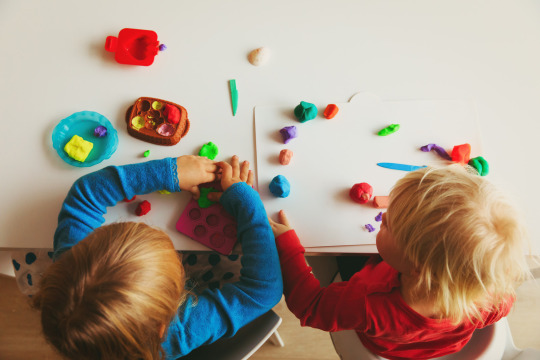
In Australia institutions are the straight command of the main government known as the academies. The version is there in the system for many years are at a topic hot political discussion, offering both the events the right by positioning there in their point of view. Right here the state government has no function to play, it cannot disrupt the working of academies, and has no contribution in the funds of these institutions.
The head of the college, the concept exists to control the everyday operation of his or her educational institution, whereas the larger facet of an academy is regulated and depend on. In addition to key and greater institutions, today there are many special demands academies.
The appropriate teaching staff
Kids with little and complicated learning problem should have to be enriched with language & learning education, and every special needs academy that provides it. These schools are known to have a right mentor team, with years of experience and the extensive knowledge to keep the international criterion of learning and increase those degrees to provide far better education to ensure that special kids make something huge in their lives. This is what makes a large distinction in between a normal college and academy. So, overall, the success of these academies, are derived by committed mentor and assistance working constantly for building a bridge of love with the kids needing special treatment.
The ideal framework
Compared to the standard colleges, the academies are blessed with a healthy and balanced infrastructure to give the right launching pad for the kids, those needing unique demands to make it big in their lives. Each unique requirements academy is transforming the measurement of understanding, through a modern setting, where there are audiovisuals spaces, a collection to help the Kids to make books as their finest buddies, play areas for them to enjoy a pleased time when within the walling of the institution.
Prior to you obtain your child with learning problem or any other special needs registered in an academy; make certain you do a history check to recognize the pros and cons of your prospective college. Additionally, it is best to speak with parents those whose children are studying in the academy where you are considering obtaining your child enlisted.
The appropriate education
Since the academies remain in straight command of the federal government; you can expect the very best education and learning given that the college is looked after by the best people. Plus, the academy is carried out considerably the principle, who usually aim everlastingly to make sure that every pupil with any kind of discovering disability is passed on with the right education and learning. Furthermore, these schools keep evolving themselves to be adaptable to fit brand-new methods of learning, which are prominent worldwide. In addition, they will certainly deal with the moms and dads and individuals with experience in the instructional vertical, to accomplish the most effective end results.
0 notes